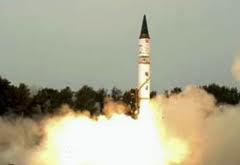
New Delhi, April 19: India on Thursday test-fired for the first time its most-ambitious strategic missile, the over 5,000-km range Agni-V, in a bid to join the super exclusive ICBM (intercontinental ballistic missile) club that counts just US, Russia,China, France and UK as its members.
The solid-fuelled Agni-V, which will bring the whole of China as well as other regions under its strike envelope, was tested from Wheeler Island off the Odisha coast at 8.07 am.
''We have met all our mission objectives,'' said a jubilant DRD0 chief controller of missiles, Avinash Chander.
DRD0 chief V K Saraswat, in turn, said India had emerged as a major missile power with Thursday's test.
The nuclear-capable, three-stage Agni-V, about 50-tonne in weight and 17.5-metre tall, will become fully operational by 2014-2015 after "four to five repeatable tests" and user trials.
India could have gone for a higher strike range but believes the solid-fuelled Agni-V is "more than adequate'' to meet current threat perceptions and security concerns. The missile can, after all, even hit the northernmost parts of China.
India, of course, cannot match China in terms of its vast nuclear and missile arsenals. But missiles like Agni-V and the 3,500-km Agni-IV, tested last November, will certainly add teeth to its credible minimum nuclear deterrence posture.
With a canister-launch system to impart higher road mobility, the missile will give the armed forces much greater operational flexibility than the earlier-generation of Agni missiles.
"The accuracy levels of Agni-V and Agni-IV, with their better guidance and navigation systems, are far higher than Agni-I (700-km), Agni-II (2,000-km) and Agni-III (3,000-km),'' said the source.
The Agni missiles will get deadlier once MIRV (multiple independently targetable re-entry vehicles) payloads for them are developed. An MIRV payload on a missile carries several nuclear warheads, which can be programmed to hit different targets. A flurry of such missiles can hence completely overwhelm BMD (ballistic missile defence) systems.






Comments
Add new comment